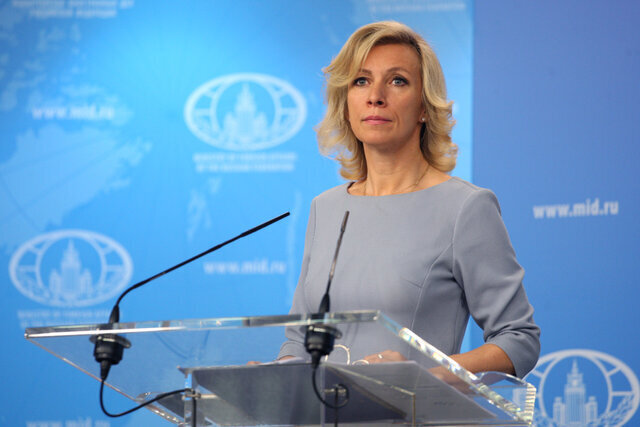Russia rebukes Europe for escalating tensions against Iran

TEHRAN — Russian Foreign Ministry spokeswoman Maria Zakharova has rebuked the UK, France, and Germany for introducing an anti-Iran resolution, saying such measures are rooted in “destructive” measures adopted by the United States against the Iran nuclear deal.
According to Press TV, Zakharova said on Monday that the European trio’s actions fueling tensions around Iran’s nuclear activities at the UN atomic watchdog contradicted their claims of commitment to the nuclear agreement – officially called the Joint Comprehensive Plan of Action (JCPOA).
“Reassurances of the British, German and French colleagues that they are committed to the Joint Comprehensive Plan of Action on the Iranian nuclear program and are looking for ways to minimize negative effects of American sanctions against Iran run counter to their actions to heighten tensions surrounding the Iranian nuclear program in the IAEA,” she said, referring to the anti-Iran resolution, which was passed by the International Atomic Energy Agency (IAEA) Board of Governors on Friday.
The Russian diplomat blamed Washington’s “destructive” measures for impeding the implementation of the JCPOA.
“The root cause of all difficulties and faults in the process of implementation of the Iranian nuclear deal has been and remains the destructive actions of the United States who unilaterally quit the JCPOA and to this day continues to systematically violate demands of UN Security Council Resolution 2231,” she pointed out.
The 35-member IAEA board demanded access to two old places they claim nuclear work may have been done there.
Nine countries out of 35 members to the IAEA board did not vote for the resolution. China and Russia voted against the resolution and Thailand, Mongolia, Niger, South Africa, India, Pakistan and the Republic of Azerbaijani abstained to vote.
Zakharova pointed out that the IAEA representatives’ access to Iranian nuclear facilities is possible within the framework of existing standard procedures.
“We are certain that all questions arising, including the agreement of access to facilities that the agency is interested in, could be resolved in the framework of standard procedures of cooperation between states and the IAEA Secretariat.”
“It is not coincidental that the resolution, in the end, was not supported by states representing more than half of the world’s population, including two UN Security Council permanent members,” she added.
The Russian diplomat maintained that Moscow and Beijing had previously warned the resolution’s sponsors that it would be counterproductive.
“We repeatedly urged against playing up to backers of the policy of maximum pressure on Iran,” she said.
China says does not approve of incendiary actions
Also on Monday, Chinese Foreign Ministry spokesperson Zhao Lijian voiced his country’s opposition to the resolution, saying China does not approve of actions that escalate the situation.
“China supports the IAEA in playing its role in an objective, professional and neutral manner in verifying Iran's compliance with its safeguards obligations,” he said during a press conference. “We are against politicizing its work.”
“The IAEA explicitly states that the safeguards issue is neither urgent nor poses a proliferation risk,” he explained, adding, “The Iranian side also expressed its clear wish to resolve issues through dialogue with the agency. Under such circumstances, China does not approve of actions that artificially exacerbate tensions and escalate the situation.”
The Chinese diplomat expressed the hope that relevant parties will remain calm, exercise restraint, and support Iran and the IAEA in resolving differences through dialogue and cooperation.
He added, “China's unwavering aim is to uphold the JCPOA, multilateralism, peace, and stability in the Middle East, and the international order based on international law. We stand ready to work closely with relevant sides for the political and diplomatic settlement of the Iranian nuclear issues.”
U.S. President Donald Trump unilaterally quit the nuclear deal in May 2018 and introduced the harshest ever sanctions in history on Iran as part of his administration’s “maximum pressure” strategy against Iran.
Iran remained fully compliant with the JCPOA for an entire year. However, in May 2019, Iran began to reduce its JCPOA commitments under Articles 26 and 36 of the deal covering Tehran’s legal rights, citing the other parties’ failure to compensate for the U.S. sanctions.
MH/PA
Leave a Comment